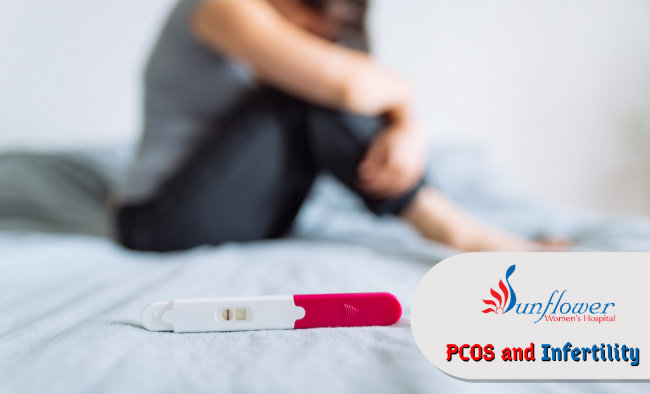PCOS and Infertility
PCOS (Polycystic Ovarian Syndrome) is a condition that has multifactorial etiology. The main culprit being insulin resistance, which in turn leads to high androgen ( male hormone) levels in the female body thereby leading to acne, excessive facial hair growth and weight gain.
Women experience anovulation and hence irregular cycles. Nearly 70 % of women with PCOS experience infertility.
The polycystic appearance of ovaries on sonography like a pearl necklace is a typical finding.
PCOS is one of the most common endocrine disorder affecting nearly 12% of women between 15- 40 years of age.
Symptoms of PCOS
The symptoms of PCOS differ greatly among patients and you may experience one or more of the following:
- Irregular periods or no periods at all
- Excessive facial and body hair
- Weight gain and obesity
- Oily skin or acne problems
- Insulin resistance
- Menstrual issues
- Infertility because of irregular or delayed ovulation
- Depression or mood swings
If you suspect for any reason that you may have PCOS, you should consult your Gynecologist.
Your specialist will order certain tests like ultrasound pelvis and hormonal evaluation like serum testosterone, DHEAS, Glucose tolerance test to aid in diagnosis.
What causes PCOS?
PCOS (Polycystic Ovarian Syndrome) is a condition that has multifactorial etiology:
Genetics – PCOS appears to run in families, however, the accurate genetic causes behind the condition are still unknown.
Obesity – Being overweight can lead to insulin resistance. This is the point when the body becomes resistant to the impact of insulin and starts to make more of it to compensate. High insulin levels lead to increased male hormone production and eventually causing disturbance of your normal period cycle and ovulation.
Environmental factors : Early exposure of androgens in the mother’s womb, to audiovisual stimulus in childhood and Xenoestrogens present in our environment.
How can PCOS lead to infertility ?
Women who have PCOS are very likely to have problems with fertility and require medical assistance in order to conceive. In fact, some women only get diagnosed with the condition upon failing to conceive.
The major reason for infertility in women with PCOS is ovulation irregularities. IF you are ovulating irregularly, it makes it difficult for you to precisely plan the fertile phase of your cycle.
If you are not ovulating at all, then it will be difficult to conceive without infertility treatment.
Treatments for PCOS related infertility
There are many treatment options available for women suffering from PCOS related infertility.
Notwithstanding, before you jump into infertility treatments and start choosing your IVF center, the first recommendation is to make some lifestyle changes, which may negate the requirement for any medical treatments.
Lifestyle changes
Often certain lifestyle modifications will improve fertility in PCOS patients. These include:
Increasing daily exercise levels – Helps decrease insulin resistance
Eating a healthy diet – High protein high fiber diet, low in carbohydrate and fats.
Reduce weight – This may assist to control some of the side effects of PCOS and help to augment fertility. By losing weight, insulin resistance will improve and the levels of male hormones should decrease.
So, making these improvements either as a first-line approach or alongside medical treatments may be worthwhile.
Ovulation induction – oral agents like letrozole and Clomiphene citrate are used as first-line agents to induce ovulation in patients with PCOS. Nearly 30-40% of patients fail to conceive in spite of these medications, for whom gonadotropins are used by an infertility specialist to induce ovulation.
IVF in PCOS – Patients who fail to conceive in spite of ovulation induction with letrozole/ clomiphene citrate, gonadotropins or laparoscopy should be offered IVF. Success rates of IVF are good in PCOS patients.
The good news is, if PCOS is effectively diagnosed and managed, the odds of conceiving are high. In most cases, either lifestyle changes or medical treatment have the desired impact. More invasive treatments are usually only required in rare cases.
To know more about infertility due to PCOS in your case, contact us on 079-27410080 / 9687607355. If you have any questions regarding PCOS and infertility, you can ask our infertility specialist at Sunflower Women’s Hospital.


Leave a Comment